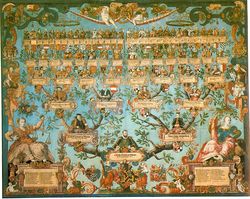Counting Your Ancestors Is Easy, If This Doesn't Happen
 By checking the family tree, Zilly Zonkers knows that his family has avoided inbreeding. If he were to trace through 5 previous generations to his great - great - great - grand parents, how many ancestors would he have counted?
By checking the family tree, Zilly Zonkers knows that his family has avoided inbreeding. If he were to trace through 5 previous generations to his great - great - great - grand parents, how many ancestors would he have counted?
Image credit: Wikipedia
This section requires Javascript.
You are seeing this because something didn't load right. We suggest you, (a) try
refreshing the page, (b) enabling javascript if it is disabled on your browser and,
finally, (c)
loading the
non-javascript version of this page
. We're sorry about the hassle.
8 solutions
It's much easier with the picure LOL
Log in to reply
loll
lolz :D yes
This confused me because I focused on "Great great grandparents", which takes us to 5 generations (including Zilly) and gives 30 ancestors.
To go to 5 PREVIOUS generations, you would get to "Great great great grandparents" it seems to me.
So the statement of the problem seems contradictory.
Am I mixed up somehow?
Log in to reply
The question states that Zilly looked through 5 previous generations, with the key word being "previous", so we know to look at the 5 prior to Zilly, rather than the 4 prior and Zilly.
Hopefully this helps clear things up.
No, you're correct. I included Zilly to, for he counts as one of the generations.
Log in to reply
Wait, I just reread the question, and it said previous generations. I'm such a fool! How did I not notice that!
Yes, I got 30 originally because of the problem wording. Maybe this should be specified more clearly in the problem.
Steven I agree. If you stop at great-great-grandparents, you have 2 parents + 4 grandparents + 8 great-grandparents + 16 great-great-grandparents = 30 ancestors.
i'm not sure!!...62
62
62
I doubled the amount all the way up to the 5th generation and then I added all the numbers that I found. So it was 2+4+8+16+32 which gave me a total of 62. I dont think it was the "smartacular" way but I just wanted to share how I got my answer.
same here,62
Its a geometric sequence with first term(x)=2, number of terms(n)=5 and common rate(r)=2 * since for every parent we have 2 grandparents(given the condition of no inbreeding)*. The formula for this is x{(1-r^n)/(1-r)}, if you followed PEMDAS you'll get 62 by substituting the givens. :)
That does make it somewhat easier but I don't think that was the author's intention. :)
This problem seems overrated... Just saying..
You have a family tree with two parents. Each parent gave birth to two children. It repeats with these children, over, and over, and over, again. (observe the picture)
So you have: 2 , which is from the two great parents (let's just leave it at that) and two + two babies, from the above description, which is 2 2 . Hmmm.... If we continue, and these four 'parents' go on to create two babies each, it becomes 8 , or 2 3 . It continues on until we reach five generations.
So our answer is, by adding up the ancestors, or "parents", we get 2 + 4 + 8 + 1 6 + 3 2 , which is 2 + 2 0 + 4 0 , which is finally 6 2 Ans.
It's a really simple geometric progression that goes multiplying by 2
SIMPLY , a progression of 32, 16, 8... so on till 2 ... find the sigma. is 62
for father 2.....for grandfather 2 2.....for great grandfather 4 2......then 8 2+16 2.sum=62
In the fifth generation we have 2 5 ancestors
In the fourth generation as each previous ancestor had only one child we have to the number of people from that generation is 2 2 5 = 2 4
In the third generation, similarly we have 2 3 ancestors
In the second generation we have 2 2 ancestors
And finally, in the first generation we have 2 ancestors
Note: we considered the previous generations and Zilly is not an ancestor.
Soon we have
2 + 2 2 + 2 3 + 2 4 + 2 5 = ( 1 + 2 + 2 2 + 2 3 + 2 4 + 2 5 ) − 1 = ( 2 6 − 1 ) − 1 = 6 3 − 1 = 6 2 ancestors.